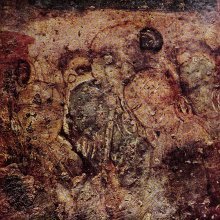Cikura, Cikūra: 13 definitions
Introduction:
Cikura means something in Hinduism, Sanskrit, Hindi. If you want to know the exact meaning, history, etymology or English translation of this term then check out the descriptions on this page. Add your comment or reference to a book if you want to contribute to this summary article.
Alternative spellings of this word include Chikura.
Images (photo gallery)
In Hinduism
Purana and Itihasa (epic history)
Source: archive.org: Puranic EncyclopediaCikura (चिकुर).—Son of Āryaka, the serpent king. Cikura had a son called Sumukha. Once Garuḍa ate Cikura for food. (Mahābhārata Udyoga Parva, Chapter 120, Verse 23).
Source: JatLand: List of Mahabharata people and placesCikura (चिकुर) is a name mentioned in the Mahābhārata (cf. V.101.23/V.103) and represents one of the many proper names used for people and places. Note: The Mahābhārata (mentioning Cikura) is a Sanskrit epic poem consisting of 100,000 ślokas (metrical verses) and is over 2000 years old.

The Purana (पुराण, purāṇas) refers to Sanskrit literature preserving ancient India’s vast cultural history, including historical legends, religious ceremonies, various arts and sciences. The eighteen mahapuranas total over 400,000 shlokas (metrical couplets) and date to at least several centuries BCE.
Languages of India and abroad
Sanskrit dictionary
Source: DDSA: The practical Sanskrit-English dictionaryCikura (चिकुर).—a.
1) Moving, tremulous, fickle, unsteady.
2) Inconsiderate, rash.
-raḥ 1 The hair of the head; मम रुचिरे चिकुरे कुरु मानद (mama rucire cikure kuru mānada) ... कुसुमानि (kusumāni) Gītagovinda 12; so घनचयरुचिरे रचयति चिकुरे तरलिततरुणानने (ghanacayarucire racayati cikure taralitataruṇānane) 7.
2) A mountain.
3) A musk-rat.
4) A reptile, snake.
5) Name of a bird.
6) Name of a tree.
7) Contraction of the eye-brows; L. D. B.
--- OR ---
Cikūra (चिकूर).—The hair.
Derivable forms: cikūraḥ (चिकूरः).
Source: Cologne Digital Sanskrit Dictionaries: Shabda-Sagara Sanskrit-English DictionaryCikura (चिकुर).—mfn.
(-raḥ-rā-raṃ) Rashly criminal, inconsiderately guilty, punishing or injuring others without consideration. m.
(-raḥ) 1. Hair. 2. A mountain. 3. A snake, a reptile. 4. A musk rat. 5. A kind of bird. 6. A kind of tree. f.
(-rā) Moving. E. ci imftative sound, and kur to utter, affix ka . ci iti avyaktaśabdaṃ kurati kura-ka .
--- OR ---
Cikūra (चिकूर).—m.
(-raḥ) Hair. E. See cikura; the vowel made long.
Source: Cologne Digital Sanskrit Dictionaries: Benfey Sanskrit-English DictionaryCikura (चिकुर).—m. 1. Hair, [Gītagovinda. ed. Lassen.] 7, 23. 2. A proper name, Mahābhārata 5, 3640.
Source: Cologne Digital Sanskrit Dictionaries: Cappeller Sanskrit-English DictionaryCikura (चिकुर).—[masculine] hair.
Source: Cologne Digital Sanskrit Dictionaries: Monier-Williams Sanskrit-English Dictionary1) Cikura (चिकुर):—mfn. inconsiderate, rash, [cf. Lexicographers, esp. such as amarasiṃha, halāyudha, hemacandra, etc.]
2) m. the hair of the head (also cihura m. [plural] [cf. Lexicographers, esp. such as amarasiṃha, halāyudha, hemacandra, etc. [Scholiast or Commentator]]), [Gīta-govinda vii, xii; Rājataraṅgiṇī viii, 367; Naiṣadha-carita vii, 108]
3) m. hair (of a chowrie), [Bālarāmāyaṇa iv, 10/11]
4) a mountain, [cf. Lexicographers, esp. such as amarasiṃha, halāyudha, hemacandra, etc.]
5) Name of a plant, [cf. Lexicographers, esp. such as amarasiṃha, halāyudha, hemacandra, etc.]
6) a snake, [cf. Lexicographers, esp. such as amarasiṃha, halāyudha, hemacandra, etc.]
7) Name of a Nāga, [Mahābhārata v, 3640]
8) a kind of bird, [cf. Lexicographers, esp. such as amarasiṃha, halāyudha, hemacandra, etc.]
9) a musk-rat (cf. cikka, cikkira), [cf. Lexicographers, esp. such as amarasiṃha, halāyudha, hemacandra, etc.]
10) Cikūra (चिकूर):—[from cikura] for kura, the hair, [cf. Lexicographers, esp. such as amarasiṃha, halāyudha, hemacandra, etc.]
Source: Cologne Digital Sanskrit Dictionaries: Yates Sanskrit-English Dictionary1) Cikura (चिकुर):—(raḥ) 1. m. Hair; a mountain; a snake; a musk-rat; a kind of bird or tree. a. Rashly criminal, rashly injuring others.
2) Cikūra (चिकूर):—(raḥ) 1. m. Hair.
Source: DDSA: Paia-sadda-mahannavo; a comprehensive Prakrit Hindi dictionary (S)Cikura (चिकुर) in the Sanskrit language is related to the Prakrit words: Ciura, Cihura.
[Sanskrit to German]
Sanskrit, also spelled संस्कृतम् (saṃskṛtam), is an ancient language of India commonly seen as the grandmother of the Indo-European language family (even English!). Closely allied with Prakrit and Pali, Sanskrit is more exhaustive in both grammar and terms and has the most extensive collection of literature in the world, greatly surpassing its sister-languages Greek and Latin.
Hindi dictionary
Source: DDSA: A practical Hindi-English dictionaryCikura (चिकुर) [Also spelled chikur]:—(nm) the hair (on the head).
...
Kannada-English dictionary
Source: Alar: Kannada-English corpusCikura (ಚಿಕುರ):—
1) [adjective] intentionally mischievous or harmful; malicious.
2) [adjective] without thought or consideration for others; thoughtless; heedless; inconsiderate; rash.
3) [adjective] moving; tremulous; fickle; unsteady.
--- OR ---
Cikura (ಚಿಕುರ):—[noun] the hair of the head.
Kannada is a Dravidian language (as opposed to the Indo-European language family) mainly spoken in the southwestern region of India.
See also (Relevant definitions)
Starts with: Cikurabhara, Cikurahasta, Cikurakalapa, Cikuranikara, Cikurapaksha, Cikurapasha, Cikuraracana, Cikuroccaya.
Ends with: Ambaracikura, Nakacikura, Pushkaracikura.
Full-text: Cikurapasha, Cihura, Cikuranikara, Cikurapaksha, Cikurabhara, Cikurahasta, Cikurakalapa, Cikkira, Cikuroccaya, Nikurumba, Cikuraracana, Cikka, Cikurita, Ciura, Chikur, Nikuramba, Cia, Gunakeshi, Capala.
Relevant text
Search found 8 books and stories containing Cikura, Cikūra; (plurals include: Cikuras, Cikūras). You can also click to the full overview containing English textual excerpts. Below are direct links for the most relevant articles:
Amarakoshodghatana of Kshirasvamin (study) (by A. Yamuna Devi)
External Anatomy < [Chapter 3 - Social Aspects]
Native Place of Kṣīrasvāmin < [Chapter 2 - Kṣīrasvāmin: Life and Works]
Chaitanya Bhagavata (by Bhumipati Dāsa)
Verse 2.245-248 < [Chapter 2 - The Lord’s Manifestation at the House of Śrīvāsa and the Inauguration of Saṅkīrtana]
List of Mahabharata people and places (by Laxman Burdak)
The Agni Purana (by N. Gangadharan)
Cosmetics, Costumes and Ornaments in Ancient India (by Remadevi. O.)
3.4. Hair Dressing: Styles and Care < [Chapter 1 - Cosmetics]
The Nilamata Purana (by Dr. Ved Kumari)
